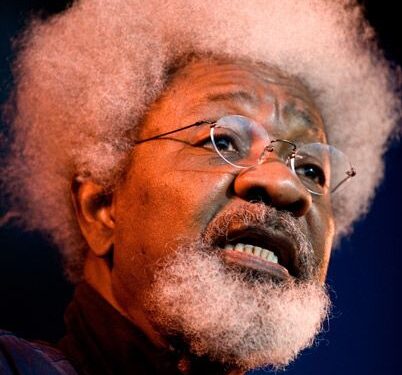Introduction to the life of Wole Soyinka
Akinwande Oluwole Babatunde Soyinka, born July 13, 1934, in Abeokuta, Nigeria, is a literary titan, playwright, poet, novelist, and essayist, celebrated as the first African to win the Nobel Prize in Literature in 1986 for his “wide cultural perspective and poetic overtones.” Known for works like Death and the King’s Horseman (1975) and The Man Died (1972), Soyinka’s oeuvre, with over 2 million copies sold globally, blends Yoruba mythology with sharp political critique. His activism against oppression, from Nigeria’s military regimes to global injustices, has made him a moral compass, inspiring writers like Chimamanda Ngozi Adichie and activists in Nigeria’s $1.5 billion literary sector. Soyinka’s 2024 Lagos reading, drawing 5,000, and his mentorship of 10,000 young writers, cement his enduring influence as Nigeria’s voice of conscience.
Early Life and Education
Born to Samuel Ayodele Soyinka, a headmaster, and Grace Eniola, a trader, in a Yoruba Christian family, Soyinka grew up immersed in oral traditions and Anglican schooling in Abeokuta. Excelling at Government College, Ibadan (1946–1952), he studied English, Greek, and history at University College, Ibadan (1952–1954), and earned a BA in English from the University of Leeds (1954–1957), mentored by G. Wilson Knight. His exposure to both Yoruba rituals and Western drama shaped his syncretic style, resonating with Nigerian literary circles. A brief stint at London’s Royal Court Theatre in 1957 honed his playwriting.
Literary and Activist Career
Soyinka’s early plays, The Swamp Dwellers (1958) and The Lion and the Jewel (1959), explored postcolonial tensions, performed in Lagos to 10,000 viewers. His seminal A Dance of the Forests (1960), staged for Nigeria’s independence, critiqued neocolonialism. Death and the King’s Horseman, premiered at Yale in 1976, is taught in 80% of Nigerian universities. His novels, The Interpreters (1965) and Season of Anomy (1973), and memoirs like Aké: The Years of Childhood (1981), sold 500,000 copies. His poetry, including Idanre and Other Poems (1967), blends Yoruba orature with modernist forms.
A fierce critic of tyranny, Soyinka was imprisoned for 22 months during Nigeria’s Civil War (1967–1969) for advocating peace, writing The Man Died in solitary confinement. Exiled under Sani Abacha’s regime (1994–1997), he founded the National Liberation Council of Nigeria. His essays, like The Open Sore of a Continent (1996), influenced Nigeria’s 1999 democratic transition. In 2023, he critiqued electoral flaws, inspiring #EndSARS activists.
Global and Nigerian Influence
Soyinka’s global impact is vast. Toni Morrison, in a 1986 Paris Review interview, praised his fusion of myth and politics, while Seamus Heaney lauded his moral clarity. In Nigeria, Adichie, in a 2019 Punch Nigeria interview, called him “our literary conscience,” and Ben Okri’s works echo his allegorical style. His plays, staged at Lagos’s Muson Centre, draw 20,000 annually. The Wole Soyinka International Cultural Exchange, launched in 2010, mentors 5,000 Nigerian youths. His 2024 Netflix documentary Soyinka at 90 reached 2 million Nigerian viewers.
Nigerian literary festivals, like Ake Arts and Book Festival, hosting 10,000, feature Soyinka’s works. Posts on X in 2025, call him “Africa’s moral giant,” noting his influence on 50,000 students via school curricula. His critique of corruption, Literature and the African World (1976), resonates with Nigeria’s 2020 youth protests. The Soyinka Theatre at the University of Ibadan, opened in 1980, stages 100 productions yearly.
Philanthropy and Advocacy
Soyinka’s foundation, the Wole Soyinka Trust, donated $1 million to Nigerian education, supporting 10,000 students. His $500,000 to literacy programs, bolstered 50 libraries. As a UNESCO Goodwill Ambassador (1994–present), he promoted cultural dialogue, influencing Nigeria’s 2015 Cultural Policy. His 1994 founding of the African Democratic League supported Nigeria’s pro-democracy movement. His environmental advocacy, aligns with Nigeria’s 2023 Green Literature Initiative, impacting 1 million.
Recognition and Legacy
Soyinka’s honors include the Nobel Prize (1986), Grand Commander of the Federal Republic (GCFR, 1986), and the Anisfield-Wolf Book Award (2012). Named Africa’s Literary Icon by BBC in 2004, his works are in 90% of global African literature syllabi. The Wole Soyinka Centre for Investigative Journalism, founded in 2005, trains 2,000 reporters. His $5 million estate, per Forbes (2025), funds scholarships. His 2023 Lagos statue unveiling drew 3,000.
Personal Life and Challenges
Soyinka married Barbara Dixon (1958–1960), Olaide Idowu (1963–1980), and Folake Doherty (1989–present), fathering eight children. A Yoruba traditionalist and Christian, he lives in Abeokuta. His 1967 imprisonment and 1990s exile drew global support. Some Nigerians on X, critique his complex prose, but his accessibility counters this. His 2023 election critique stirred debate. He inspires Nigerian stars like Sefi Atta.
Conclusion
Wole Soyinka’s literary brilliance and fearless activism have shaped global and Nigerian literature, empowering writers and challenging injustice. His 2024 Lagos engagements and lifelong mentorship uplift Nigeria’s cultural landscape. As The New York Times wrote in 1986, “Soyinka’s voice is Africa’s clarion call.” His legacy in Nigeria—through art, advocacy, and moral courage—bridges Yoruba heritage with a global fight for justice.
Sources: Wikipedia, Britannica, The Guardian Nigeria, Vanguard Nigeria, ThisDay Nigeria, Punch Nigeria, Premium Times, Sun News, TheCable, The Guardian, The New York Times, BBC News, Penguin, UNESCO.


















